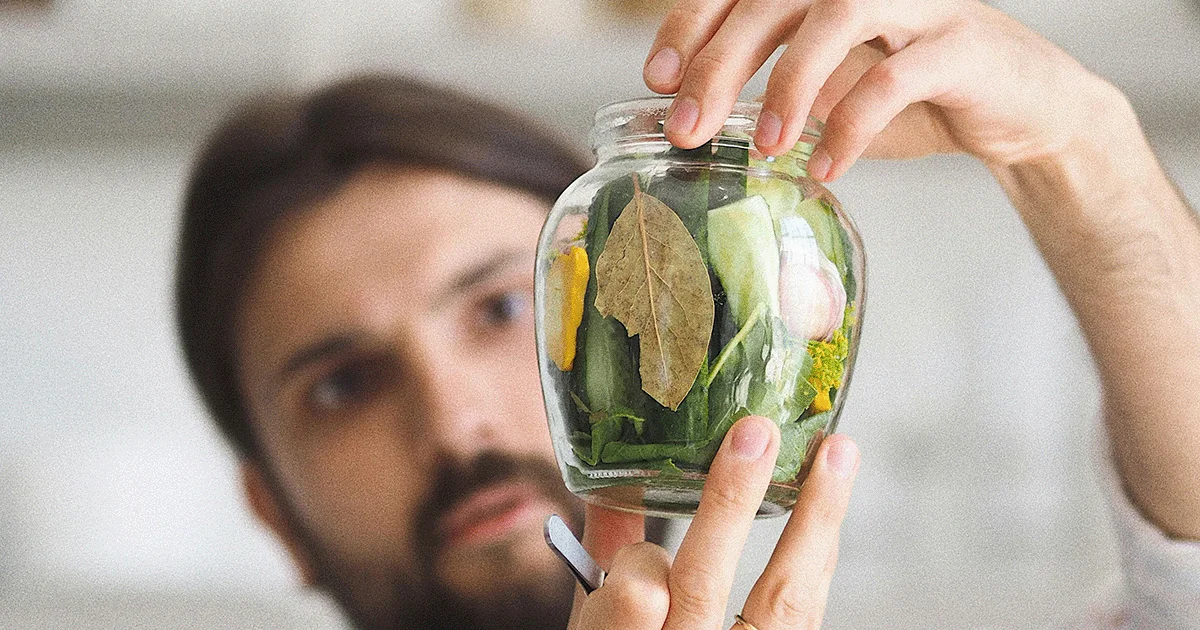Here's what we'll cover
Here's what we'll cover
Plants care about their health, too. In fact, they produce phytonutrients, also called phytochemicals, as a way to stay healthy. Some of these plant nutrients protect it from bugs, and others protect against disease. But many of them also benefit the health of humans who eat those plants. Lycopene is one of those phytochemicals. This natural pigment and antioxidant gives some fruits and veggies their signature pink or red color—and also has many potential health benefits for humans.
You probably associate lycopene with tomatoes. Tomato products do account for roughly 80% of dietary lycopene intake in the United States (Soares, 2017). And even some foods that we now watch for their sugar content, like ketchup and tomato sauce, boast exceedingly high lycopene content. But they're far from the only sources. Other pink and red produce, such as watermelon and pink grapefruit are rich sources. But not every piece of scarlet produce has lycopene. Cherries, raspberries, and plums don't have this specific, powerful antioxidant, though they have others.
Health benefits of lycopene
There are constantly many chemical reactions going on inside of cells. Some of these chemical reactions create byproducts known as free radicals. Free radicals are unstable atoms that can cause damage to cells, which is known as oxidative damage. Over time, oxidative damage can lead to serious problems, such as rheumatoid arthritis, cardiovascular disease or heart disease, type 2 diabetes, Alzheimer’s, and even certain cancers (Hajhashemi, 2010).
Antioxidants like lycopene function by binding up free radicals, making it so they can’t cause as much damage to cells. Essentially, antioxidants like lycopene and free radicals need to be balanced to prevent health problems caused by having too much of either.
It's an antioxidant and carotenoid
Lycopene has some serious antioxidant properties. It’s also a carotenoid, a group of fat-soluble pigments produced naturally by plants that give them their signature yellow, orange, and red colors. So lycopene is what gives ripe, raw tomatoes their deep red hue, but it’s just one carotenoid. Others make pumpkins bright orange or corn golden yellow. Beta-carotene is another well-known plant pigment that gives carrots their yellow-orange color and also benefits human health.
Although we like to say that antioxidants like lycopene “fight free radicals,” it’s more accurate to say they balance them to prevent disease-causing damage to cells. As we outlined above, oxidative damage to cells has been linked to a wide range of chronic diseases. A diet high in lycopene-rich tomato and other fruits and vegetables can help prevent that stress by maintaining equilibrium between antioxidants and free radicals in your body.
May protect against certain types of cancer
Research has looked into lycopene’s effects on multiple types of cancer, from prostate cancer to lung cancer. While some initial studies are promising, there currently isn’t enough evidence to make any claims about lycopene’s effects on cancer.
May help lower risk of heart disease
Heart disease has also been linked to oxidative stress, but we’ve already told you plenty about the antioxidant benefits you get from keeping your lycopene levels high. Want even more reason? High levels of lycopene intake are associated with an overall reduction of 17–26% in heart disease risk (Jacques, 2014).
But there are other risk factors for developing cardiovascular disease beyond oxidative damage. Many factors influence your heart health, such as your HDL and LDL cholesterol levels, blood pressure, and triglyceride levels.
Metabolic syndrome is a condition in which people suffer from a cluster of these symptoms, including increased blood pressure, high blood sugar, excess fat around the waist, and abnormal cholesterol levels. And having metabolic syndrome puts you at an increased risk of stroke, type 2 diabetes, and heart disease. But people with metabolic syndrome with a high lycopene intake may lower their risk of dying prematurely by roughly 37%, a study found (Han, 2016).
Boosting your intake of lycopene may help decrease your heart disease risk by also increasing “good” HDL cholesterol while lowering total and “bad” LDL cholesterol levels (Palozza, 2012). And a meta-analysis of six clinical trials found that higher doses of daily lycopene (> 12 mg) were associated with lower systolic blood pressure in Asians and people with high blood pressure (Li, 2013). Systolic blood pressure, the pressure in your blood vessels when your heart contracts or beats, is considered a greater cardiovascular risk factor than diastolic blood pressure, the pressure in your blood vessels when your heart rests between beats (Banegas, 2002).
May prevent exercise-related asthma
Researchers believe that it’s the antioxidant effect of this plant nutrient that causes another one of the effects of lycopene: improved asthma symptoms (Wood, 2008). One small study looked to test the effects of lycopene treatment specifically on exercise-induced asthma.
They tested the participants’ pulmonary (lung) function before and after exercise as a baseline, then put participants on either lycopene or placebo supplements for a week before running the test again. After one week of supplementation, 55% of the people given lycopene saw a significant improvement in their lung function after exercise (Neuman, 2000).
May help reduce risk of macular degeneration in old age
It’s not surprising that lycopene may benefit your eye health. After all, it’s a carotenoid like the beta-carotene found in carrots, which is known for its ability to help protect eyesight. One of the beneficial effects of a diet high in lycopene may be some protection from cataracts (Gupta, 2003). Work has mostly been done on animals and in test tubes, so human studies are needed to confirm these findings.
Age-related macular degeneration (AMD) is the biggest cause of blindness in older adults (Schleicher, 2013). There’s hope that lycopene may play a role in this disease, but findings are certainly mixed, with some research finding no connection between AMD and lycopene. Other research has found that patients with AMD also have low serum levels of lycopene, suggesting there may be a connection after all (Cardinault, 2005). And another confirmed the inverse, that people with high levels of lycopene were associated with a decreased risk of developing AMD (Mares-Perlman, 1995).
May protect skin from UV damage
You eat tomato products, and your skin may be protected from the sun. It sounds implausible, and yet research seems to back it. In one small study, for example, participants were given tomato paste in olive oil, others just olive oil daily for 12 weeks. At the end of this time, they were exposed to UV light, and the damage to their skin was assessed. The skin of those who had supplemented with tomato had less severe skin reactions than those who had not (Rizwan, 2011).
It’s important to note, though, that even if lycopene intake offers some protection from UV rays, this effect in no way mimics or can replace the use of sunscreen.
How to get enough lycopene
It probably comes as no surprise that tomatoes are far and away the biggest food source of lycopene in the American diet. But you may not know that there’s actually no established reference dietary allowance (RDA) of this nutrient. Studies have looked at daily intakes within the range of 8–21 mg per day, and this intake is associated with many of the benefits outlined above.
But this phytochemical is considered generally safe, so intakes above 21 mg of lycopene per day—which may be more common in summer months when lycopene-rich foods like watermelon, papaya, and guava are all in season—likely aren’t cause for concern.
In rare cases, excessive lycopene intake has caused lycopenodermia, discoloration of the skin. One woman who came in with the condition reported drinking roughly two liters of tomato juice daily for several years (Trumbo, 2005).
If you regularly enough any tomato products, from a glass of tomato juice in the morning to a serving of tomato paste in your pasta, you likely don’t need a lycopene supplement, though they are available.
These supplements may interfere with certain prescription medications, like blood thinners and blood pressure drugs. Lycopene supplementation may also not offer the same health benefits as a robust dietary intake. Lycopene consumption from dietary sources seemed to have a bigger impact on heart disease risk than supplements, one study found (Burton-Freeman, 2014).
The research was done only on tomato consumption, so more work needs to be done to confirm these findings, but it may be a good idea to boost your intake through food sources when possible.
DISCLAIMER
If you have any medical questions or concerns, please talk to your healthcare provider. The articles on Health Guide are underpinned by peer-reviewed research and information drawn from medical societies and governmental agencies. However, they are not a substitute for professional medical advice, diagnosis, or treatment.
Assar, E. A., Vidalle, M. C., Chopra, M., & Hafizi, S. (2016). Lycopene acts through inhibition of IκB kinase to suppress NF-κB signaling in human prostate and breast cancer cells. Tumor Biology, 37 (7), 9375–9385. doi: 10.1007/s13277-016-4798-3. Retrieved from https://www.ncbi.nlm.nih.gov/pubmed/26779636
Banegas, J. R., Cruz, J. J. D. L., Rodríguez-Artalejo, F., Graciani, A., Guallar-Castillón, P., & Herruzo, R. (2002). Systolic vs diastolic blood pressure: community burden and impact on blood pressure staging. Journal of Human Hypertension, 16 (3), 163–167. doi: 10.1038/sj.jhh.1001310. Retrieved from https://www.ncbi.nlm.nih.gov/pubmed/11896505
Burton-Freeman, B. M., & Sesso, H. D. (2014). Whole Food versus Supplement: Comparing the Clinical Evidence of Tomato Intake and Lycopene Supplementation on Cardiovascular Risk Factors. Advances in Nutrition, 5 (5), 457–485. doi: 10.3945/an.114.005231. Retrieved from https://www.ncbi.nlm.nih.gov/pubmed/25469376
Cardinault, N., Abalain, J.-H., Sairafi, B., Coudray, C., Grolier, P., Rambeau, M., et al. (2005). Lycopene but not lutein nor zeaxanthin decreases in serum and lipoproteins in age-related macular degeneration patients. Clinica Chimica Acta, 357 (1), 34–42. doi: 10.1016/j.cccn.2005.01.030. Retrieved from https://www.ncbi.nlm.nih.gov/pubmed/15963792
Chen, P., Zhang, W., Wang, X., Zhao, K., Negi, D. S., Zhou, L., et al. (2015). Lycopene and Risk of Prostate Cancer. Medicine, 94 (33), e1260. doi: 10.1097/MD.0000000000001260. Retrieved from https://www.ncbi.nlm.nih.gov/pubmed/26287411
Giovannucci, E. (2002). A Review of Epidemiologic Studies of Tomatoes, Lycopene, and Prostate Cancer. Experimental Biology and Medicine, 227 (10), 852–859. doi: 10.1177/153537020222701003. Retrieved from https://europepmc.org/article/med/12424325
Gupta, S. K., Trivedi, D., Srivastava, S., Joshi, S., Halder, N., & Verma, S. D. (2003). Lycopene attenuates oxidative stress induced experimental cataract development: an in vitro and in vivo study. Nutrition, 19 (9), 794–799. doi: 10.1016/s0899-9007(03)00140-0. Retrieved from https://www.ncbi.nlm.nih.gov/pubmed/12921892
Hajhashemi, V., Vaseghi, G., Pourfarzam, M., & Abdollahi, A. (2010). Are antioxidants helpful for disease prevention. Research in Pharmaceutical Sciences, 5 (1), 1–8. Retrieved from https://pubmed.ncbi.nlm.nih.gov/21589762/
Han, G.-M., Meza, J. L., Soliman, G. A., Islam, K. M., & Watanabe-Galloway, S. (2016). Higher levels of serum lycopene are associated with reduced mortality in individuals with metabolic syndrome. Nutrition Research, 36 (5), 402–407. doi: 10.1016/j.nutres.2016.01.003. Retrieved from https://www.ncbi.nlm.nih.gov/pubmed/27101758
Jacques, P. F., Lyass, A., Massaro, J. M., Vasan, R. S., & Sr, R. B. D. (2013). Relationship of lycopene intake and consumption of tomato products to incident CVD. British Journal of Nutrition, 110 (3), 545–551. doi: 10.1017/s0007114512005417. Retrieved from https://www.ncbi.nlm.nih.gov/pubmed/23317928
Li, X., & Xu, J. (2013). Lycopene Supplement and Blood Pressure: An Updated Meta-Analysis of Intervention Trials. Nutrients, 5 (9), 3696–3712. doi: 10.3390/nu5093696. Retrieved from https://www.ncbi.nlm.nih.gov/pmc/articles/PMC3798929/
Mares-Perlman, J. A. (1995). Serum Antioxidants and Age-Related Macular Degeneration in a Population-Based Case-Control Study. Archives of Ophthalmology, 113 (12), 1518. doi: 10.1001/archopht.1995.01100120048007. Retrieved from https://www.ncbi.nlm.nih.gov/pubmed/7487619
Michaud, D. S., Feskanich, D., Rimm, E. B., Colditz, G. A., Speizer, F. E., Willett, W. C., & Giovannucci, E. (2000). Intake of specific carotenoids and risk of lung cancer in 2 prospective US cohorts. The American Journal of Clinical Nutrition , 72 (4), 990–997. doi: 10.1093/ajcn/72.4.990. Retrieved from https://www.ncbi.nlm.nih.gov/pubmed/11010942
Neuman, I., Nahum, H., & Ben-Amotz, A. (2000). Reduction of exercise-induced asthma oxidative stress by lycopene, a natural antioxidant. Allergy(55) 12, 1184–1189. doi: 10.1034/j.1398-9995.2000.00748.x. Retrieved from https://pubmed.ncbi.nlm.nih.gov/11117277/
Palozza, P., Catalano, A., Simone, R., Mele, M., & Cittadini, A. (2012). Effect of Lycopene and Tomato Products on Cholesterol Metabolism. Annals of Nutrition and Metabolism, 61 (2), 126–134. doi: 10.1159/000342077. Retrieved from https://www.karger.com/Article/Fulltext/342077
Rizwan, M., Rodriguez-Blanco, I., Harbottle, A., Birch-Machin, M., Watson, R., & Rhodes, L. (2010). Tomato paste rich in lycopene protects against cutaneous photodamage in humans in vivo: a randomized controlled trial. British Journal of Dermatology, 164 (1), 154–162. doi: 10.1111/j.1365-2133.2010.10057.x. Retrieved from https://www.ncbi.nlm.nih.gov/pubmed/20854436
Schleicher, M., Weikel, K., Garber, C., & Taylor, A. (2013). Diminishing Risk for Age-Related Macular Degeneration with Nutrition: A Current View. Nutrients, 5 (7), 2405–2456. doi: 10.3390/nu5072405. Retrieved from https://www.ncbi.nlm.nih.gov/pubmed/23820727
Soares, N., da C. P., Machado, C. L., Trindade, B. B., Lima, I. C. do C., Gimba, E. R. P., Teodoro, A. J., et al. (2017). Lycopene Extracts from Different Tomato-Based Food Products Induce Apoptosis in Cultured Human Primary Prostate Cancer Cells and Regulate TP53, Bax and Bcl-2 Transcript Expression. Asian Pacific Journal of Cancer Prevention, 18 (2), 339–345. doi: 10.22034/APJCP.2017.18.2.339. Retrieved from https://www.ncbi.nlm.nih.gov/pubmed/28345329
Trumbo, P. R. (2005). Are there Adverse Effects of Lycopene Exposure? The Journal of Nutrition, 135 (8), 2060S–2061S. doi: 10.1093/jn/135.8.2060S. Retrieved from https://academic.oup.com/jn/article/135/8/2060S/4664032
Wood, L. G., Garg, M. L., Powell, H., & Gibson, P. G. (2008). Lycopene-rich treatments modify noneosinophilic airway inflammation in asthma: Proof of concept. Free Radical Research, 42 (1), 94–102. doi: 10.1080/10715760701767307. Retrieved from https://www.ncbi.nlm.nih.gov/pubmed/18324527










